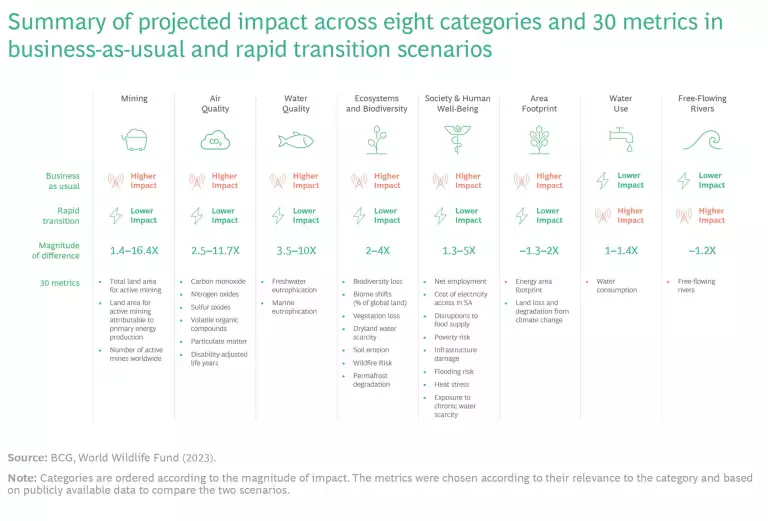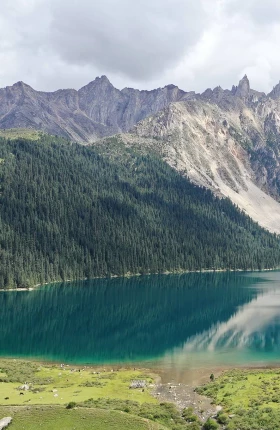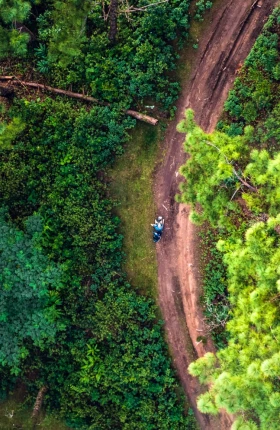New research shows that transitioning to an energy system powered by renewables would be far better for the planet than continuing to pursue current policies. In fact, a rapid transition (RT) scenario results in better outcomes than a business-as-usual (BAU) scenario across 27 of 30 impact metrics.
A rapid transition to renewable energy for our global energy system is essential to mitigating climate change and ensuring a livable future for our planet. Its urgency cannot be overstated. Nonetheless, this transition will place demands on local communities and natural ecosystems through such factors as greater land use, increased mining of critical metals, and potential loss of traditional energy-related jobs.
To better understand the validity of these concerns, BCG and the World Wildlife Fund (WWF) performed exhaustive research using data from the most recent Intergovernmental Panel on Climate Change (IPCC). Using this data, we examined two energy scenarios at opposite ends of the transformation spectrum: a BAU scenario that continues current policies, and an RT scenario that limits global warming to 1.5°C with limited overshoot.
We found that an energy system powered by renewables would perform from two to 16 times better for nature and people across a range of metrics than would a BAU, conventional energy system—although the transformation would indeed place demands on certain natural resources and local communities.
We also found that a well-planned and executed transformation can address both climate and nature risks—producing nature-positive outcomes that far exceed those from retaining today’s conventional energy system.
Of course, the extent to which any energy transformation scenario succeeds will depend on how well it is implemented. Policymakers, decision-makers, and other stakeholders will need to deploy laws, incentives, and environmental planning tools and engage meaningfully with affected communities in order to minimize or avoid unwanted impact on nature and people.
Two Illustrative Scenarios
The RT scenario relies on rapid growth of renewable energy, electrification (including electric vehicles), and energy-efficiency improvements along with optimized sustainable development. The alternative BAU scenario would continue the current policies of a conventional energy system. (See Exhibit.)

Our research finds that the RT scenario would not only be far better for nature and society than the BAU scenario but that better outcomes would occur across 27 of the 30 impact metrics we assessed. The most improved outcomes are in actively mined land, air quality, water quality, biodiversity loss, land lost and degraded from climate change, poverty risk, exposure to chronic water scarcity, biome shifts, heat stress, and flooding risk. These enhanced results are possible largely due to the decommissioning of coal mines, reduction in combustion processes, and lower climate change impact under the RT scenario.
Three impact metrics initially showed worse outcomes in the RT scenario: water use, free-flowing rivers, and land use. However, in all three cases, there are mechanisms that can dramatically reduce the impact; in addition, the land lost due to climate change in the BAU scenario is far higher than the land used under RT.
A Nature-Positive Energy Transformation
To support a potential RT, BCG and the WWF have created a framework of mechanisms with high potential to shift energy systems onto a nature-positive pathway. These include the following:
- Policy makers should integrate conservation into their decision-making early in the planning process.
- Energy planners should create a national or grid-scale portfolio of energy technologies that optimizes energy, nature, and social objectives.
- Multiple strategies should be undertaken to reduce the footprint of the renewable transition on land, oceans, and rivers.
- Sites should be chosen for renewable energy projects that will have minimal negative impact on nature and communities.
- The impact from critical minerals mining should be addressed through existing strategies, such as developing circular economies, increasing energy efficiency, avoiding critical habitats and the deep ocean, and investing in new research and development for alternative materials.
- Regional planning should proactively improve outcomes for the environment and communities while increasing the efficiency of permitting, siting, and developing energy projects.
- Renewable energy projects should be designed, built, and operated in ways that reduce impact on species and ecosystems.
A rapid energy transition would be not only better for the planet but essential to our well-being. Countries around the globe need to rapidly transition to renewable energy sources to cut emissions and avoid the worst-case scenarios of global warming beyond 1.5°C. This effort will require going beyond local, regional, and national transitions and toward a broad transformation of our global energy system that supports net-zero , nature-positive, and sustainable development outcomes. But such a transition will only be possible if there is a more fundamental shift in how energy systems are planned and developed to stabilize the climate, reverse the nature crisis, and deliver development and economic benefits to people around the world.
The authors would like to thank Jeff Opperman, Stephanie Roe, Ryan Bartlett, and Dean Cooper of the WWF for their invaluable contributions to this article.
This article is adapted from a report created by BCG and the WWF , an independent conservation organization with over 30 million followers and a global network active in nearly 100 countries. Read the full report.









